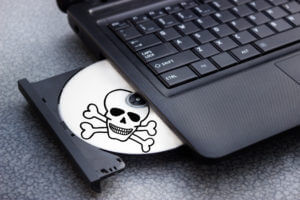ALERT! If your business Is knowingly using pirated software (or even if you’re not 100% confident it’s not), you MUST read this to learn the expensive hot water your business can get into if you get caught!
According to the Business Software Alliance, software piracy is defined as the unauthorized copying or distribution of copyrighted software.
This can be done by copying, downloading, sharing, selling, or installing multiple copies onto personal or work computers. It’s illegal, increases security risks, and can wreak havoc on your computer network and diminish employee productivity.
A Cautionary Tale from One of Our Own Small Business Clients
Last month I received a phone call from a distressed business manager from one of my clients regarding a very threatening letter he received from the law firm that represents the Business Software Alliance.
The letter accused my client’s company of copyright infringement by way of installing copies of Adobe and Microsoft software without properly licensing them. Amidst the letter were stern threats of recovery of damages, legal fees, and statutory damages of up to $20,000.
This isn’t the first phone call I’ve received like this and in fact, I’m getting more and more of these types of calls from clients, small and medium businesses ranging in employee size from 15 to 40 staff.
Small Business Is Now A BIG Target for Legal Action
Given that the small business sector is a fast-growing segment of the economy, software providers are now going after small business with a vengeance to ensure that all of their products are properly licensed. And the settlements can be huge, ranging from a minimum of $15,000 to over $15M.
I recently read about a Halifax-based company with under 20 staff members that was found guilty of piracy, and fined over $20,000. In addition, this company had to pay thousands for their own legal fees to deal with the suit, and those of the Plaintiff they were ordered to cover.
When that financial hemorrhaging was done they had to purchase the software anyway (as is always the case in these situations).
Thousands of Businesses Are Using Pirated Software Every Day without Management Even Knowing
Many CEO’s and management executives don’t even know (like my client) that pirated software was being used in their business because:
- The software was installed before they joined the company
OR
- Their staff installed it without their knowledge
OR
- Their IT support provider wanted to save them some money
In most, if not all cases, the employee or IT provider secured pirated software only with the intent to save money – not realizing the ramifications of doing so.
Piracy Can Cost Your Business More Than Cold Hard Cash
Reduced Productivity / Performance Issues:
Software pirated from sharing sites on the internet is often hacked, and features often don’t fully function as they are supposed to. Plus, you can’t get access to bug fixes from the vendor as they are released. If software that you purchased legally has been copied multiple times, some of the copies may not be able to receive bug fixes.
Security Risk:
Software pirated from sharing sites often contains spyware that can infect your network resulting in theft of your confidential data.
Time and Stress:
Your management team will waste time and experience a lot of stress as they deal with a software audit, lawyers and potential litigation.
Steps to Make Sure You Are Properly Licensed
To make sure you can defend a claim, or prevent one in the first place, take these steps:
1. Create a culture of compliance:
- Devise a formal policy, internally, stating that all software installed on every server, computer, laptop, and handheld must be approved by management, and properly licensed.
- Create a filing system or tracking sheet where you centrally document all purchased software, license numbers, and each location where the software is installed.
- Keep all software media in a locked cabinet where only individuals responsible for installation or maintenance of your system, have access.
- Severely restrict who has the capability to install new software on company assets.
- Complete an audit with your IT support provider
Ask your IT provider what’s currently installed on all systems and assemble a list of all licenses that have been purchased. Once this has been completed, determine any shortcomings, and purchase licensing as required.
How Do Companies Get Caught With Pirated Software?
Hell Hath No Fury Like The Disgruntled Employee!
The Business Software Alliance makes it easy and quite lucrative for whistleblowers who come in the form of terminated or disgruntled former and current employees to report knowledge of pirated software.
By placing a simple phone call to a 1-800 number, or filling out an on-line form they can confidentially report infractions that pave the way for the Business Software Alliance to start an investigation.
Awards from $5,000 to $1M can be paid to the whistleblower based on the settlement against the offending company. Clearly, settlements of this size serve as a real incentive for that disgruntled employee to reap their revenge.
In the last few months the BSA has taken to advertising on the radio about reporting software piracy, and touting the rewards to whistleblowers.
MORALE OF THE STORY:
It’s cheaper to buy the software upfront than to deal with the cost and aggravation of an audit, legal fees and fines in the future. And it’s the law.
If you have any questions or suspect that your company may be using pirated software and need advice, feel free to contact Joe Stoll at Technical Action Group at JStoll@TAG.


